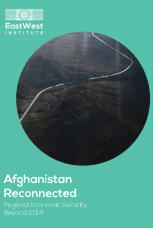BECOME A MEMBER
>JOIN
Afghanistan Reconnected - Regional Economic Security Beyond 2014

On June 14, voters in Afghanistan will decide on the country’s next president in the second round of presidential elections. A smooth political transition in June 2014, preceding the withdrawal of international combat troops in December, will be an encouraging development for Afghanistan’s transformation from war to peace, stability and greater prosperity for its people based on private-public sector economic activity, gradually replacing war and international aid.
Afghanistan should no longer be perceived as an unstable war zone. Investment is becoming more attractive, because of the improving legal and political framework. Many regional and international companies from China, India, Pakistan, Canada and Europe are now planning to invest. There are attractive opportunities to unlock resources worth nearly $3 trillion, including massive veins of coal, copper, lithium, gold, deposits of gemstones and substantial natural gas and oil fields. Afghanistan is a trade hub at the crossroads of Asia, connecting the Indian subcontinent with Central Asia, the Middle East and China, a region with some of the world’s fastest growing economies hungry for Afghanistan’s natural resources.
In 2013, EWI convened a series of high-level consultations on the economic potential of Afghanistan and the region post-2014, also known as the Abu Dhabi Process. Representatives of governments, parliaments, NGOs and the business community—from Afghanistan, India, Pakistan, Uzbekistan, Tajikistan, Kyrgyzstan, Turkmenistan, China, the United Arab Emirates, Turkey, the United States and Europe—had in-depth dialogue about major regional economic challenges and opportunities for infrastructure, energy, trade and investment. The business community in the region is often driving change, ahead of government actors. There is also a long history of political tension, mistrust and security risks. EWI’s multi-stakeholder meeting process provided an innovative platform for information exchange and for trust-building between these parties. As a result of this intensive, multi-year process, the institute has created an effective network of high-level business and political decision-makers, change agents and advocates for regional economic cooperation.
These consultations highlighted Afghanistan’s strategic location as a trade and transit hub, as well as the win-win potential for interregional trade and investment. Afghanistan Reconnected: Regional Economic Security Beyond 2014 outlines this encouraging picture for an improved economy and more prosperity for the people of Afghanistan and the region.
For example, two major energy projects are moving ahead: the TAPI gas pipeline from Turkmenistan via Afghanistan and Pakistan to India, and the CASA1000 electricity grid Afghanistan also has nutrient-rich soils for significant agricultural output. Agriculture generates 50 percent of the country’s GDP and supports 85 percent of its people. Once called the “Garden of Central Asia,” Afghanistan produces high-value crops like raisins, pomegranates, pistachios and almonds, in high global demand. Yet, the country lacks a functioning packaging industry. Current packaging procedures are outdated and damage fresh goods on route to markets, preventing an effective export business for many crops. Commercial transport and infrastructure will also be a high-growth sector, as the country exploits its agricultural and natural resources. There are also increased transshipment opportunities for goods through Afghanistan.
There are encouraging developments on the policy front, such as the extension of the trade agreement between Pakistan and Afghanistan to Tajikistan and also to India. The Afghan Parliament also recently passed mining laws to encourage investment in mineral extraction.
With the contributions of Abu Dhabi Process participants, this thorough EWI report presents the great possibilities and remaining challenges to a bright future in Afghanistan.

